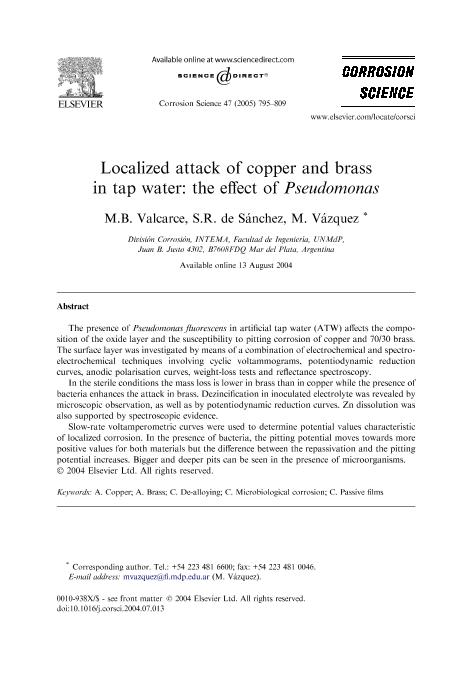Mostrar el registro sencillo del ítem
dc.contributor.author
Valcarce, María Beatriz

dc.contributor.author
Rosso de Sanchez, Maria Susana

dc.contributor.author
Valcarce, María Beatriz

dc.date.available
2019-02-25T17:38:36Z
dc.date.issued
2005-12
dc.identifier.citation
Valcarce, María Beatriz; Rosso de Sanchez, Maria Susana; Valcarce, María Beatriz; Localized attack of copper and brass in tap water: The effect of Pseudomonas; Pergamon-Elsevier Science Ltd; Corrosion Science; 47; 3 SPEC. ISS.; 12-2005; 795-809
dc.identifier.issn
0010-938X
dc.identifier.uri
http://hdl.handle.net/11336/70780
dc.description.abstract
The presence of Pseudomonas fluorescens in artificial tap water (ATW) affects the composition of the oxide layer and the susceptibility to pitting corrosion of copper and 70/30 brass. The surface layer was investigated by means of a combination of electrochemical and spectro-electrochemical techniques involving cyclic voltammograms, potentiodynamic reduction curves, anodic polarisation curves, weight-loss tests and reflectance spectroscopy. In the sterile conditions the mass loss is lower in brass than in copper while the presence of bacteria enhances the attack in brass. Dezincification in inoculated electrolyte was revealed by microscopic observation, as well as by potentiodynamic reduction curves. Zn dissolution was also supported by spectroscopic evidence. Slow-rate voltamperometric curves were used to determine potential values characteristic of localized corrosion. In the presence of bacteria, the pitting potential moves towards more positive values for both materials but the difference between the repassivation and the pitting potential increases. Bigger and deeper pits can be seen in the presence of microorganisms. © 2004 Elsevier Ltd. All rights reserved.
dc.format
application/pdf
dc.language.iso
eng
dc.publisher
Pergamon-Elsevier Science Ltd

dc.rights
info:eu-repo/semantics/openAccess
dc.rights.uri
https://creativecommons.org/licenses/by-nc-sa/2.5/ar/
dc.subject
A. Brass
dc.subject
A. Copper
dc.subject
C. De-Alloying
dc.subject
C. Microbiological Corrosion
dc.subject
C. Passive Films
dc.subject.classification
Otras Ciencias Químicas

dc.subject.classification
Ciencias Químicas

dc.subject.classification
CIENCIAS NATURALES Y EXACTAS

dc.title
Localized attack of copper and brass in tap water: The effect of Pseudomonas
dc.type
info:eu-repo/semantics/article
dc.type
info:ar-repo/semantics/artículo
dc.type
info:eu-repo/semantics/publishedVersion
dc.date.updated
2019-02-11T14:15:19Z
dc.journal.volume
47
dc.journal.number
3 SPEC. ISS.
dc.journal.pagination
795-809
dc.journal.pais
Estados Unidos

dc.journal.ciudad
Cambridge
dc.description.fil
Fil: Valcarce, María Beatriz. Consejo Nacional de Investigaciones Científicas y Técnicas. Centro Científico Tecnológico Conicet - Mar del Plata. Instituto de Investigaciones en Ciencia y Tecnología de Materiales. Universidad Nacional de Mar del Plata. Facultad de Ingeniería. Instituto de Investigaciones en Ciencia y Tecnología de Materiales; Argentina
dc.description.fil
Fil: Rosso de Sanchez, Maria Susana. Consejo Nacional de Investigaciones Científicas y Técnicas. Centro Científico Tecnológico Conicet - Mar del Plata. Instituto de Investigaciones en Ciencia y Tecnología de Materiales. Universidad Nacional de Mar del Plata. Facultad de Ingeniería. Instituto de Investigaciones en Ciencia y Tecnología de Materiales; Argentina
dc.description.fil
Fil: Valcarce, María Beatriz. Consejo Nacional de Investigaciones Científicas y Técnicas. Centro Científico Tecnológico Conicet - Mar del Plata. Instituto de Investigaciones en Ciencia y Tecnología de Materiales. Universidad Nacional de Mar del Plata. Facultad de Ingeniería. Instituto de Investigaciones en Ciencia y Tecnología de Materiales; Argentina
dc.journal.title
Corrosion Science

dc.relation.alternativeid
info:eu-repo/semantics/altIdentifier/doi/https://dx.doi.org/10.1016/j.corsci.2004.07.013
dc.relation.alternativeid
info:eu-repo/semantics/altIdentifier/url/https://www.sciencedirect.com/science/article/pii/S0010938X04001829
Archivos asociados
